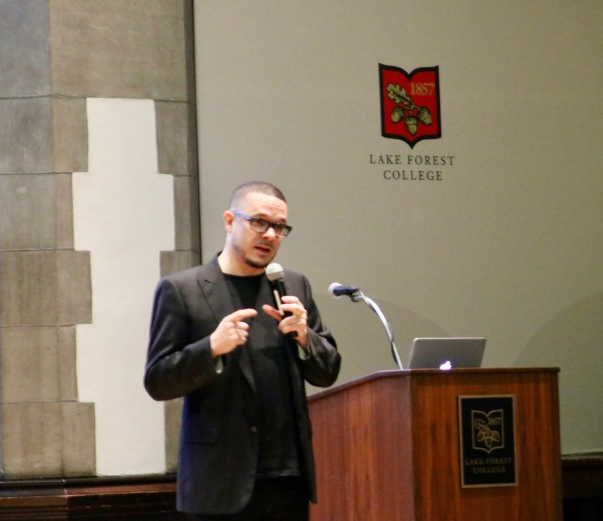Black Lives Matter Activist Shaun King Visits Campus

The Article below was published in Vol. 135, Issue 5 of the Lake Forest College Stentor on February 7, 2020
Emma Overton ’22 and Josh Hager ’22
Editor-in-Chief and News Section Editor, Staff Writer
As part of week-long programming honoring the life and legacy of Dr. Martin Luther King Jr, Lake Forest College welcomed Shaun King, a noted Black Lives Matter activist with over 1 million Twitter followers and the founder of the Real Justice PAC, Flip the Senate, The Action PAC, the North Star Newspaper, and host of “The Breakdown” podcast, to deliver a keynote address entitled “Reflections on Dr. King and The Future of The Civil Rights Movement” on January 20.
Delivering his remarks to an audience of approximately 80 students, faculty, staff and community members in the Lily Reid Holt Memorial Chapel, King acknowledged that Dr. King himself had visited the campus of Lake Forest College, stating “I’m honored to be in a space that he shared.”
Acknowledging the student activism on campus related to issues of bias and sexual misconduct, King noted: “I am at least glad that we are at an institution that is making those conversations possible and just as Lake Forest College was the type of college that was open to bringing Dr. King on campus in the 1960s, many of the faculty, staff, and students that I spoke to today were encouraged that at least space was made for us to have difficult conversations.”
Reflecting on the significance of the holiday, King stated “today is what we call King Day and I saw a painful tweet from Bernice King, who was the daughter of Dr. King. She reminded us that the reason Dr. King is not here for us to tell him Happy Birthday is that he was murdered. And our country has been a place that has, for a very long time, murdered some of its greatest leaders. Dr. King could have been the honorary speaker today, but he was taken from us…what did we miss because of his murder?”
King further noted that the “I Have A Dream” speech is a “revolutionary speech…there is a whole section where [Dr. King] talks about police brutality…in the beginning of his speech he says something they never play…he quotes some of America’s founding documents and talks about how this country has not lived up to the promises in those founding documents…he says that the country has written black people a bad check and the check came back marked ‘insufficient funds.’”
Discussing his own career, King noted that he is a “historian by training…I think that most people think that I’m a full-time Twitter personality, but I swear I’m not.” King introduced Leopold Von Ranke, the “father of the study of history” who created one of the first detailed timelines of human history and “spent 40 plus years doing it as his life’s work.” Von Ranke initially thought that over the course of history, humans were getting better and smarter, basing his hypothesis on Darwin’s theory of evolution. However, as Von Ranke soon discovered, he “confused the steady improvement of technology with the steady improvement of humanity,” and concluded that the “trajectory of human history is not a linear progression, but a series of dips and peaks.”
Arguing that humanity has experienced many dips, King showed images of a slave ship diagram from the Transatlantic slave trade, images from the Holocaust, and images from the Rwandan genocide, asking the audience rhetorically, “If we are supposedly getting better and better, how do we explain this?” Noting that “we live in a deeply problematic time in history…we are currently in a dip in humanity,” King stated that “there is no telling how long this dip will last…90 days, a decade, 400 years…[but] the good news is that there has been no dip in human history that people did not eventually get out of,” however, the rise out of the dip was historically associated with war.
Although King noted that he was not calling for a war, he did call on the students in the audience to pull humanity out of the current dip. “I’m not saying that we need a war, but I am saying that we will need a warlike effort…If we get out of the dip, it will be up to you. You will do more in your lifetime to get us out of here than those who are older.”
Additional programming in honor of Dr. Martin Luther King Jr. organized by the Office of Intercultural Relations featured Truth Be Told Table Talks and Art Making on January 21, a Poetry Slam on January 22, a Community March and Art Exhibit on January 23, a performance from the Chicago Mass Choir on January 24, and the Diversity and Inclusion Summit on January 25.